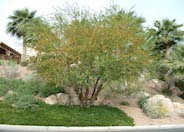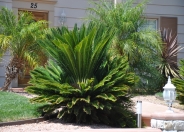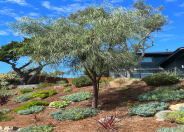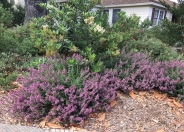
Common name: Sweet Acacia
Botanical name: Acacia farnesiana
Sweet Acacia is a large thorny shrub or small tree has a soft texture as a result of its finely divided leaves. Bright yellow flowers have a light, sweet fragrance. The bloom is heaviest in the spring and may continue intermittently throughout summer and fall. It is evergreen in mild winters. Soil tolerant even poorly drained. Branches are armed with paired spines to 2".

Common name: Sago palm
Botanical name: Cycas revoluta
Sago palm resembles small palms; it is evergreen. It can slowly grow to 10' tall so consider the space around it when planting it. It is used for a tropical effect and also looks great in planters. In the low desert, light shade and additional moisture are best. It does best with well draining soil. Side sprouts can form multi-trunked individuals. Apply fertilizer at leaf expansion. This plant has few pests. The leaves and seeds are poisonous to animals. Sago palm is also used for bonsai. Established plants need little water and care.

Common name: Shoestring Acacia
Botanical name: Acacia stenophylla
This plant is a fast growing, tough, open evergreen tree 15'-40' tall, with a wispy, picturesque habit. It has showy, creamy yellow flowers borne in small globular clusters against stems from late winter through spring. It tolerates heavy soils and inundation. It is very drought tolerant when established and hardy to at least 20'. It is somewhat Texas Root Rot prone but is tolerant and tough; good in groves; of Australian origin. Also known as: Dalby Myall

Common name: Wall Germander
Botanical name: Teucrium x lucidrys
This small shrub reaches 1' tall and 2' wide, with small, shiny, dark green, aromatic leaves on woody stems can be sheared and shaped. Lovely, reddish purple or white flowers appear between the upper leaves during summer. It can be used as a low hedge plant in herbal knot gardens or has a ground cover. To encourage branching, it should be pruned in the spring. It prefers full sun and well draining soil. It does not tolerate wet soil. It is drought tolerant once it's established.